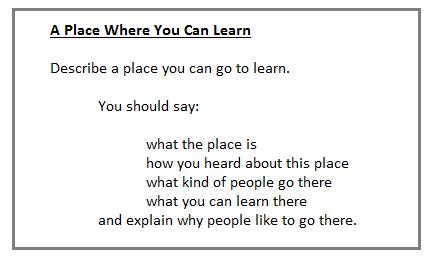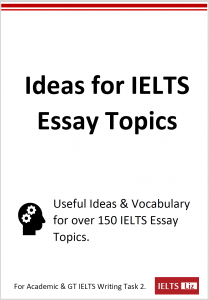This lesson gives useful advice on how to develop and improve your IELTS speaking at home for free. The tips run through what the examiner will assess you on in your test and what you can do to improve on your own without a teacher. Learn to analyse your answers for IELTS speaking, find your weaknesses and build your strengths.
Transcripthello in this lesson I’m gonna show you
how to improve
and develop your IELTS speaking at home so many
students
tell me that they cannot improved their
English
because they don’t have a foreigner to
talk to so I want to show you that
it is possible
to improve your speaking at home
on your own for free now the first thing
I want you to do
is to get a list of topics the common topics
for
speaking part 1 speaking part 2
and speaking part 3 if you cannot find a
list
please go to my IELTS blog www.ieltsliz.com
and you will find a
list
of common topics difficult topics and
the questions as well so you need to get
a list of these topics and develop
ideas I don’t want you to write down
your answers I want you
only to develop the ideas so for
example
if the topic is the topic weather
you can develop ideas about the kind of
weather you like
what you do when the weather is like
that
also how the weather makes you feel
different kinds of weather or maybe the
transportation problems
that come because of that weather so just
develop ideas that you can use
for that topic the next thing number two
is a word list so vocabulary if you have
the topic of
weather you need to have arrange a
vocabulary
for that topic so for example
hot weather hot is a very low band
score
but you could use boiling
scorching sweltering
there’s a whole range a vocabulary
you can build to impress the examiner
for that topic so you need to get that
list of vocabulary
and learn it number three
your next step to developing your
speaking
get the topic weather
choose probably about let’s say 6
questions for that topic take
your telephone and answered the
questions
recording your voice it’s very important
that you
do the recording rather than writing the
answer
when you write answers usually
you think more about the grammar you
think more about the vocabulary
and often you make less mistakes when
you speak
it’s direct so when you record your
answer this gives you a chance to find
your weaknesses finding your weaknesses
very important so that you can improve
so you need to
record your answers to those questions
on your phone
after that I want you to listen to
to your answers listen and
check now there are four things that I
want you to check for
I want you to check for fluency
vocabulary
grammar and pronunciation this is what
the examiner
will check you on now each one
in the exam the is 25 percent
of your marks with so their
all equal they are all very important
and the examiner is going to check your
answer
for each one now let’s have a look at
what you need to check
for each one fluency what does that
mean
well the first thing that you need to
check
is the length
of your answer did you give a very short
answer
or could you develop it a little bit
more
when you develop your answer a little bit
more
that is a higher band score you’re
offering
the examiner more language but you’re
showing the ability
to speak fluently so
develop your answer more higher band score
another thing that you can check for
your fluency
is how many times you say um
ah these are hesitations
and we don’t want hesitations in our
answer
so you need to check how many um how
many
ah that you have if
you have a lot that’s a problem I’m afraid
and you need to find a way to practice
more
so that you get rid of the ums and ahs
so we’ve got the length
of answer and the ums and ahs
another thing that you can check for
fluency how many times
you are silent
often when students start speaking
they can’t remember what they want to say
and suddenly they stopped
it is not good to stop and be silent
in the middle of your answer you need
to fill it
you need to keep speaking naturally with
a good flow
and that will give you a good band score
so those are
three things that you can check in your
answer
for your fluency now the next thing
is vocabulary
what do we need to check in the
vocabulary
for your answer well obviously the first
thing is
the range and the range means how many
different words are you using I’ll give
you an example
so paraphrasing
are you repeating the same word again
and again
or are you using different words
to describe same thing so again we use
the example of
hot you could say boiling scorching
sweltering those a three different words
that we can use
for the meaning of hot so you need to show
a good range
vocabulary that’s from your word list
and you need to paraphrase and show the
ability to use
different words for the same meaning
when you paraphrase as well you are
looking
at band score 7and band score 8
another thing you can look at with
vocabulary
of course are
mistakes
now one way that you can check your
mistakes
is by when you listen to to you answer
listen and write down the words that you
say
that way you can check more carefully
if you’re making any mistakes with words
are you using the wrong word are you using
the wrong
noun with the verb what problems do you
have
so check that in your answer
another thing to look at of course
grammar
and with grammar you need to check again
the range so for example the range
of tenses are you
giving only present simple
now I know maybe the six questions that
you have are
all present simple questions but that
doesn’t mean
that you can’t give another tense
so for example what kind of weather do
you like
I just love hot weather scorching
weather last week
it was perfect so it was a present
simple
question but I gave a little bit
of past simple in the answer
so you can practice doing that and
develop the technique
of putting different tenses into your
answer
another thing you can look at is
sentence structure
and that means how complex are your
sentences
are you using a lot of short sentences
so don’t forget listen to your answer write
down the words that you’re using
and then check how complex the sentences
are
you can perhaps start using some linkers
and start extending the sentences
and of course another thing for grammar
again are
mistakes this is very important
more mistakes you make lower your band score
will be so remember that the examiner
is listening for mistakes with
vocabulary and grammar
so please check what mistakes you’re
making and correct them
and practice and of course the last one
is pronunciation so what is
the examiner looking for
pronunciation
well the first one of course is word
pronunciation are you pronouncing
those words correctly
if you are not sure about that you can
go online
there are free dictionaries online so
that you can
lesson to the pronunciation of the word
so check that and make sure your words are
correct
another thing is individual
sounds so for example sh
s ch are you pronouncing these sounds
correctly
and again you can find practice
online for that
and one other thing for pronunciation
is intonation
intonation is if your voice is
going up and down or if you are speaking
like this if you’re speaking
very flat this is not good
for your band score you need to learn to use
intonation in your voice we often use
intonation
to make something more interesting or to
show when something is important
so you can practice that at home and try to
improve it
now the last part of the last thing once
you have
got your topics in your ideas you’ve got
your vocabulary for the topic
you have your questions and you record
them
you listen you check your answer
don’t forget you can write down the
answer to check
what you say write down the words you’re
using
check your fluency vocabulary grammar
and pronunciation
and then after that
practice practice and practice
find your weakness get rid of your
weakness
improve your strength so you practice
and record again don’t forget to keep
recording your voice keep recording your
answers
get used to that I know
it can feel uncomfortable to sit in a
room
alone and record but really
it’s good practice you need to do it
right well that’s all for this lesson
I really hope that you practice this at
home
honestly the more you practice the
better you IELTS will be
particularly if you check
your answers correctly well
keep practicing good luck and I’ll see you
in
another IELTS lesson






